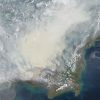-
 +20 +1
+20 +1China’s Failing Satellite is just One Example of a Massive Space Debris Problem
Aside from that 19,000-pound Chinese satellite set to crash down this weekend, there are many more pieces of space junk in orbit.
-
 +28 +1
+28 +1European Satellites Are Tracking Sinking Buildings
Radar scans showed that a San Francisco high-rise sank twice as fast as previously thought.
-
 +21 +1
+21 +1What Would Happen If G.P.S. Failed?
The radio signal that is the lifeblood of the Global Positioning System originates from a constellation of twenty-four satellites, orbiting more than twelve thousand miles above Earth. When it reaches the ground, after about sixty-seven milliseconds, it is so weak as to be almost imperceptible. (G.P.S. experts often compare processing the signal to trying to read by the light of a single bulb in a city...
-
 +5 +1
+5 +1Scientists plot sea levels using GPS satellites
Accurate sea level measurements are more critical than ever, but there are a limited number of radar satellites designed for that purpose. However, a team from the UK's National Oceanography Centre (NOC), University of Michigan and NASA's Jet Propulsion Laboratory have discovered a new way to do so using much cheaper and more plentiful GPS satellites. The technique is called GNSS-R, and involves bouncing low-powered signals from GPS satellites off of the...
-
 +34 +1
+34 +1North Korea satellite 'tumbling in orbit'
The satellite North Korea fired into space on Sunday is "tumbling in orbit" and incapable of functioning in any useful way, a senior U.S. defense official told CNN. Sunday's launch of the long-range rocket triggered a wave of international condemnation and prompted strong reaction from an emergency meeting of the U.N. Security Council. North Korea maintained the launch was for scientific and "peaceful purposes."
-
 +57 +1
+57 +1Al Jazeera America to close down
Unsustainable business model cited in decision to close, as global network announces a new digital drive in US market
-
 +41 +1
+41 +1Satellites Expose Just How Bad Indonesia’s Fires Are
Indonesia has been aflame for a couple months now. That happens every fall—the country’s fire season is severe—but this time around, things are the worst they’ve been in almost two decades. This year’s crazy-strong El Niño has desiccated the region’s peat beds, while palm oil plantations exacerbate the problem by cutting down trees and draining the normally soggy land.
Submit a link
Start a discussion




















